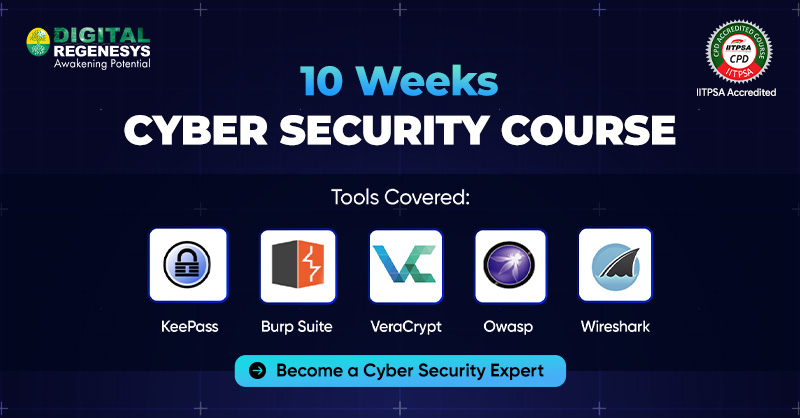Cybersecurity Course Syllabus in SA: Must-Read Guide for Job Seekers

If you are considering a career in cybersecurity, knowing what to expect from the cybersecurity course syllabus in SA is the first step towards building confidence that gives you clarity on what to expect and how these courses are structured to prepare you for the job market. A typical syllabus includes essential areas such as network security, ethical hacking, digital forensics, and risk management, all designed to develop practical skills that employers seek. This combination ensures you not only gain technical expertise but also the confidence to apply your knowledge in real-world settings.
This article provides South African job seekers with a clear guide to the cybersecurity course syllabus and qualifications needed to build a successful career.
Core Modules in Cybersecurity Course Syllabus in South Africa
The cybersecurity course syllabus in SA gives aspiring professionals both the technical foundation and the confidence to apply their skills in practical settings. Suppose one wants to pursue their future career in cybersecurity. In that case, taking a Certification Course in Cybersecurity is a beginner-friendly option, which will help build practical skills and prepare one for the workforce.
To provide a clearer view, here are the core modules that are often included.
Basic Module
This module introduces fundamental cybersecurity concepts and basic practices essential for protecting digital information. With these basics down, one will be ready to explore how threats and defences work in practice.
The basic module covers:
- Fundamental Cybersecurity Concepts – Understand what cybersecurity is and why it matters, laying a strong foundation for all future learning.
- Threats, Vulnerabilities and Mitigation Techniques – Learn to identify risks and the practical steps to safeguard systems from attacks.
- Security Architecture – Discover how to design systems that are secure by structure, using multiple layers of defence.
- Security Operations – Get hands-on with monitoring and responding to security events to keep systems safe daily.
- Governance, Risk and Compliance – Understand the rules, responsibilities, and legalities that ensure organisations stay secure and compliant.
Intermediate Module
This module focuses on practical skills to secure operating systems, manage data, and strengthen everyday online defences. These practical skills helps one to protect data, passwords, and everyday communication channels.
The intermediate module covers:
- Windows 101 & Linux 101 – Grasp the basics of popular operating systems to understand where vulnerabilities can appear.
- Data Protection – Learn how to secure documents and verify their integrity.
- Password Management – Master creating and managing strong, secure passwords.
- Email Protection & Browser Hardening – Discover how to secure your communication channels and internet browsing.
- Threat Hunting and Behavioural Analysis – Develop skills to detect unusual activity that signals potential attacks proactively.
- Password Cracking – Understand attacker methods to better prepare defences.
Advanced Module
This module deepens technical expertise in specialised areas like network security and real-time threat detection using advanced tools. It builds on the knowledge gained in the intermediate module and helps to build expertise further..
The advanced module includes:
- Network Security Essentials – Protect data flow across complex networks with advanced techniques.
- Web Application Security Essentials – Secure online applications from common and sophisticated attacks.
- SIEM and EDR Essentials – Use powerful tools to detect and respond to security events both centrally and on endpoints.
- SOC Essentials – Learn how security teams coordinate to monitor and respond to threats in real time.
Assessment & Projects
This stage allows learners to apply their knowledge through real-world case studies and hands-on projects, preparing them for professional roles. These projects develop ones ability to handle complex cybersecurity scenarios confidently.
- Case Study Assignments & Digital Forensics Business – Apply your learning to real-world scenarios and understand the business side of investigations.
- Mini and Capstone Projects – Demonstrate your expertise with hands-on projects that bring all your skills together.
Read More – Is Cybersecurity in Demand in South Africa? Objectives and Career Scope

Skills One Gains After Completing Cybersecurity Course in South Africa
This cybersecurity certificate confirms your ability to handle cyber risks, respond promptly to threats, and apply best practices that foster resilience, ensure compliance, and build trust in a digital world.
To give you a clearer view, here is a detailed look at the skills one will develop:
- Knowledge of Security Principles – Gain a clear understanding of core concepts like confidentiality, integrity, and availability, which are the building blocks of any strong cybersecurity strategy.
- Insights into Real-World Cyber Threats and Defence Strategies – Experience practical learning about common and emerging threats, helping you recognise attack methods and effectively defend systems.
- Proficiency in Encryption and Privacy Tools – Learn to use encryption technologies that protect sensitive data and meet legal standards such as POPIA and GDPR, keeping information secure and private.
- Exposure to Threat Detection Techniques – Develop skills to spot unusual or suspicious activities in networks and systems quickly, which is crucial for stopping attacks before they cause damage.
- Practical Expertise in Web Application Security – Understand how to identify weaknesses in websites and apps, learning best practices to safeguard these essential business tools against hackers.
- Hands-On Experience with SOC and EDR Tools – Get real experience using Security Operations Centre platforms and Endpoint Detection and Response tools to monitor, investigate, and respond to security incidents effectively.
- Security Awareness Training – Teaching others to recognise threats strengthens overall organisational security, making it a critical soft skill.
You may also like – Resilience in Cybersecurity | Understanding Its Functions, Components & More!
Job Alignment for Cybersecurity in South Africa
Cybersecurity offers a wide range of career paths, and understanding how courses fit with job roles helps learners plan their futures effectively. The cybersecurity course syllabus in SA is designed to provide both theoretical knowledge and practical skills that match industry requirements in South Africa.
The following roles demonstrate how the knowledge and skills acquired in the course translate into professional opportunities:
- Cybersecurity Analyst – Monitors systems, detects threats, and responds to incidents. Learners develop skills in analysing vulnerabilities and implementing defensive measures.
- Penetration Tester / Ethical Hacker – Simulates attacks to identify system weaknesses. This role of ethical hacking in SAbuilds problem-solving and hands-on technical expertise.
- Network Security Engineer – Designs, implements, and maintains secure networks. Students gain experience with firewalls, VPNs, and intrusion detection systems.
- Security Consultant – Advises organisations on best practices and risk management. The role combines technical expertise with strategic planning and effective communication.
- Digital Forensics Specialist – Investigates breaches and recovers critical evidence. Learners practise tracing attacks, analysing data, and supporting legal or corporate investigations.
- Cloud Security Engineer – Protects cloud infrastructure and applications. Students develop expertise in access management, monitoring, and risk mitigation.
- SOC Analyst (Security Operations Centre) – Monitors, detects, and responds to threats in real-time. Learners gain hands-on experience with monitoring tools, alerts, and security protocols.
- Cybersecurity Manager / Security Lead – Oversees teams, develops policies, and ensures compliance. Leadership, planning, and strategic decision-making are emphasised in the syllabus.
Conclusion
Taking a cybersecurity course in South Africa gives you the practical skills and knowledge you need to step confidently into the job market. The cybersecurity course syllabus in SA covers core areas such as network security, ethical hacking, digital forensics, cloud protection, and risk management, ensuring students build practical and theoretical expertise. Hands-on training, simulations, and projects enable learners to apply their knowledge to real-world scenarios, making them job-ready from the start.
Visit Digital Regenesys to explore more about the latest ongoing and evergreen career choices and opportunities trending in today’s job market.
Last Updated: 8 October 2025
